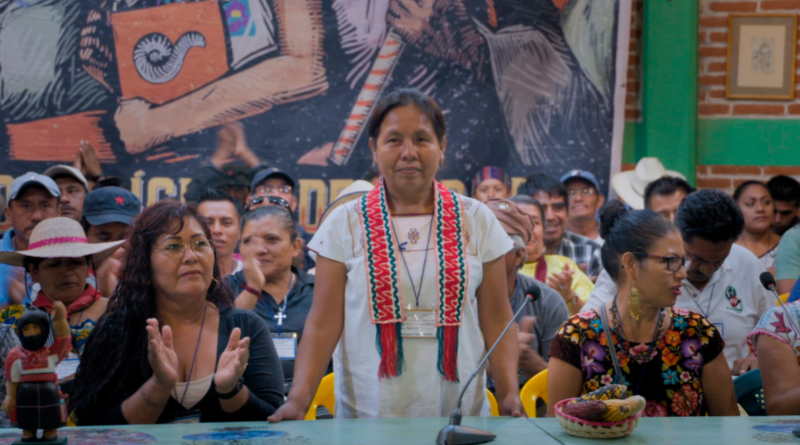INTERVIEW: Remembering Marichuy’s historic run for president of Mexico
Photo: The Spokeswoman, directed by Luciana Kaplan, follows Marichuy, the first Indigenous woman to run for the Mexican presidency. Photo courtesy of Cinema Tropical / Provided with permission.
When María de Jesús Patricio, better known as Marichuy, ran for president of Mexico, she made history. Even though her candidacy was an uphill battle, she brought attention to vital issues impacting the many communities she represented.
Marichuy was the first Indigenous woman to run a high-profile campaign for the top political office in the country. A new documentary from Mexican-Argentine filmmaker Luciana Kaplan follows Marichuy on the campaign trail, reliving those momentous months when she grabbed the headlines and tried to affect change in the country. The Spokeswoman has been well received on the film festival circuit, with prominent placement at the Guadalajara Film Festival and San Francisco International Film Festival.
In the film, Kaplan is able to capture the moment when Mexico’s Indigenous communities banded together to put together a unified candidate speaking in one voice for Indigenous rights, the environment and the status of women. Marichuy’s candidacy, although not victorious in the end, still brought national attention to Indigenous rights, and Kaplan was there for almost every moment of the journey.
Marichuy, according to press notes, is a traditional healer and human rights activist from the Nahua nation. In the film, Kaplan finds “hope and optimism” in her run for the presidency, despite the societal challenges facing Indigenous individuals and communities.
Recently Hollywood Soapbox exchanged emails with Kaplan about her new movie. The filmmaker was born in Argentina and has lived in Mexico for the past 40-plus years. Her previous credits include Eufrosina’s Revolution and Rush Hour; her next documentary will be Invisibility Treaty. Questions and answers have been slightly edited for style.
What motivated you to tell the story of María de Jesús Patricio?
First of all, I saw it as a historical event that needed to be documented, and I was offered the opportunity to do it by Carolina Coppel, the film’s producer. To show the immense challenge of an Indigenous woman supported by the EZLN and the National Indigenous Council while they were touring around the country, questioning the existing democratic system, sounded like a once in a lifetime experience.
Was it difficult following her on this journey around the country?
It was hard to tour around the country looking for the best places to shoot, as there were so many stops on the tour, and it was impossible to get it all. So I had to follow my instincts of what were the most important places and communities for the film and why. Of course, sometimes it worked very nicely and others not that much; those are the risks while you are shooting a documentary film.
What do you believe her campaign achieved? Do you feel there is now more attention to the issues she talked about?
I think that Marichuy’s campaign worked in many ways. One was to put on the table for discussion again the voice and demands of the Indigenous communities, as she became very popular in the media, and her message was communicated to a wider audience. The other was the amazing organization that was formed not only inside the communities, but with the intellectual and urban students collectives that were involved. The campaign inspired thousands of people. The other important issue was the female empowerment inside and outside the Indigenous communities that Marichuy brought with her role as the spokeswoman, as women were called to participate in the first lines as they were the ones who actually toured and spoke during the campaign.
How important is it for moviegoers and society in general to see stories of Indigenous culture and Indigenous rights?
I think Indigenous communities have a lot to say about the defense of the land and the future of the planet as they are certainly the land keepers. Their ways of thinking about comunal-assembly organization and autonomic representation are probably the most inspiring speeches you can find in the world right now, especially as we are passing through a severe environmental, social and political crisis. I hope this movie can be a source of inspiration as well as a call for action.
What’s the plan for the future distribution of the documentary?
The film is now touring in different festivals around the world. We are also organizing a community tour all over Mexico to bring the film to the places where Marichuy toured as well as to other communities that didn’t have the possibility to participate at the time, so that’s really big. We will have outdoor screenings with solar energy produced by the company Ecocinema. It is one of the most successful community screening tour projects in Mexico. We also have plans to appear on digital platforms by October 2021, but that will be announced soon.
By John Soltes / Publisher / John@HollywoodSoapbox.com
The Spokeswoman is currently playing film festivals. Click here for more information.

